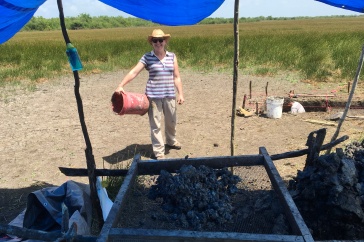
The UNH Graduate School's Dissertation Year Fellows are exploring myriad issues with real-world implications.
Devon O'Rourke
Program/Department: Molecular & Evolutionary Systems Biology
Millions of North American bats have died from white nose syndrome (WNS), an invasive fungal disease first detected in 2006. Devon O’Rourke’s dissertation addresses why the survivors survived.
“While initial studies found correlations between bat behavioral and survival, no work has yet directly evaluated whether these persisting populations ultimately survive because of underlying genetic factors,” he says.
His research involves sequencing the genomes of hundreds of disease-resistant and disease-susceptible bats. O’Rourke says it’s the first diagnostic evaluation of a population’s capacity to resist WNS and provides a template for future investigations with other species threatened by the disease. His data will offer insight into the recovery likelihood of the two bat species decimated by WNS and what that recovery might look like. But it’s not all about the bats.
“Without that top predator in place we're not really sure how insect abundances would shift and what downstream ecological impacts that would have,” he says.
His research also involves studying the seasonal and geographic variation in New England bat diets, which in the long run can improve pest-management strategies, inform conservation efforts and shape land use strategies of forested areas affected by invasive pests.
O’Rourke worked at his former high school, Berkshire School, before heading off to graduate school. He wants to impact change in science education, which he thinks should be discovery-based and promote ownership. He plans to graduate in May 2019.
Te-Hsin Chang
Program/Department: Education
Whether or not students feel that their teachers care can tremendously impact their development, both cognitively and noncognitively; however, it’s still a subject that hasn’t seen a great deal of research.
“In an era of accountability focused almost exclusively on standardized testing, there has been little empirical research investigating the impact of critically important noncognitive factors such as care,” says Te-Hsin Chang, a doctoral candidate in education.
Chang, who earned an undergraduate degree in sports and recreation at Taipei Physical Education College, focuses on care theory in her three-part dissertation. Through her work, Chang offers a methodological critique of current measures of care in quantitative research in education, and she has developed a theoretically and psychometrically sound instrument to measure caring relationships between students and teachers in educational settings.
“My study will provide an important contribution to both the theory and measurement of student-teacher caring relationships and on a larger scale can inform educational policy and practice recommendations related to noncognitive factors in education and learning,” she says.
Chang plans to graduate in May 2019.
Miranda J. Francoeur
Program/Department: Psychology
In order to treat disorders such as schizophrenia, addiction, autism, ADHD and dementia, we need to better understand how the prefrontal cortex (PFC) and its connections function. That’s where Miranda J. Francoeur comes in.
Much of the doctoral candidate’s dissertation focuses on the thalamus, which until recently, was thought simply to pass environmental and sensory information to certain areas in the brain.
Her research contributes to a growing argument that both the PFC and thalamus influence executive functions, which in turn impact things like decision-making, attention and memory. The research is important, she says, as right now treatment options for psychological disorders don’t consider the thalamus as a target area for intervention.
“My research will clarify what types of information neurons in the thalamus transfer to prefrontal cortex and whether this information is critical for executive functions,” she says. “Acknowledging the role of thalamus for executive functions will expand our understanding of why failures occur and provide insight for new treatment options.”
Francoeur, originally from Somersworth, New Hampshire, earned a bachelor’s degree in neuroscience from UNH in 2014 and entered the doctoral program directly afterward. Her plan is to graduate in May 2019 and then apply to postdoctoral research positions.
Interested in a doctoral program? Explore the offerings available through the UNH Graduate School.
-
Written By:
Kristen Melamed | Graduate Admissions
















































